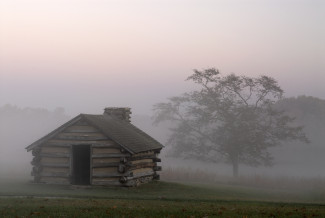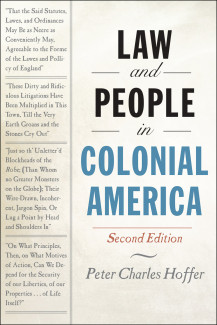
Johns Hopkins UniversityEst. 1876
America’s First Research University
Law and People in Colonial America

How did American colonists transform British law into their own? What were the colonies' first legal institutions, and who served in them? And why did the early Americans develop a passion for litigation that continues to this day? These questions and more are answered in Law and People in Colonial America – an essential, rigorous, and lively introduction to the beginnings of American law. To mark the publication of the second edition of the book, author Peter Charles Hoffer writes:
"I have taught early American history for nearly 50 years, and American legal history for 35 of those years. So much has changed in our emphases over these years, but one change stands out. When I began teaching, slavery was one of the many subjects we covered, but only one. In the past 15 years, it has become a central, for some the central, subject of interest and study. The second edition of Law and People in Colonial America devotes a full, up-to-date chapter to slave law and slavery in the law, including comparative materials on slave law throughout the Atlantic World. As I prepared the new chapter, I realized how rich and how broad the new studies of slavery were, and how vital slave labor, based on the law, was to the economic, cultural, and political development of the colonies. As teaching informs our scholarship, so that scholarship guides our classroom offerings. When I had finished the revisions, I realized how far my teaching of slavery had come from that first lecture, so long ago."

In Law and People in Colonial America, Hoffer tells the story of early American law from its beginnings on the British mainland to its maturation during the crisis of the American Revolution. For the men and women of colonial America, Hoffer explains, law was a pervasive influence in everyday life. Because it was their law, the colonists continually adapted it to fit changing circumstances. They also developed a sense of legalism that influenced virtually all social, economic, and political relationships. This sense of intimacy with the law, Hoffer argues, assumed a transforming power in times of crisis. In the midst of a war for independence, American revolutionaries used their intimacy with the law to explain how their rebellion could be lawful, while legislators wrote republican constitutions that would endure for centuries.
Today the role of law in American life is more pervasive than ever. And because our system of law involves a continuing dialogue between past and present, interpreting the meaning of precedent and of past legislation, the study of legal history is a vital part of every citizen's basic education. Taking advantage of rich new scholarship that goes beyond traditional approaches to view slavery as a fundamental cultural and social institution as well as an economic one, this second edition includes an extensive, entirely new chapter on colonial and revolutionary-era slave law. Law and People in Colonial America is a lively introduction to early American law. It makes for essential reading.
Order the newly released second edition of Law and People in Colonial America – published on November 5, 2019 – at this link: https://jhupbooks.press.jhu.edu/title/law-and-people-colonial-america
Peter Charles Hoffer is a distinguished research professor of history at the University of Georgia. He is the author of Law and People in Colonial America, Sensory Worlds in Early America, Prelude to Revolution: The Salem Gunpowder Raid of 1775, and John Quincy Adams and the Gag Rule, 1835–1850.


